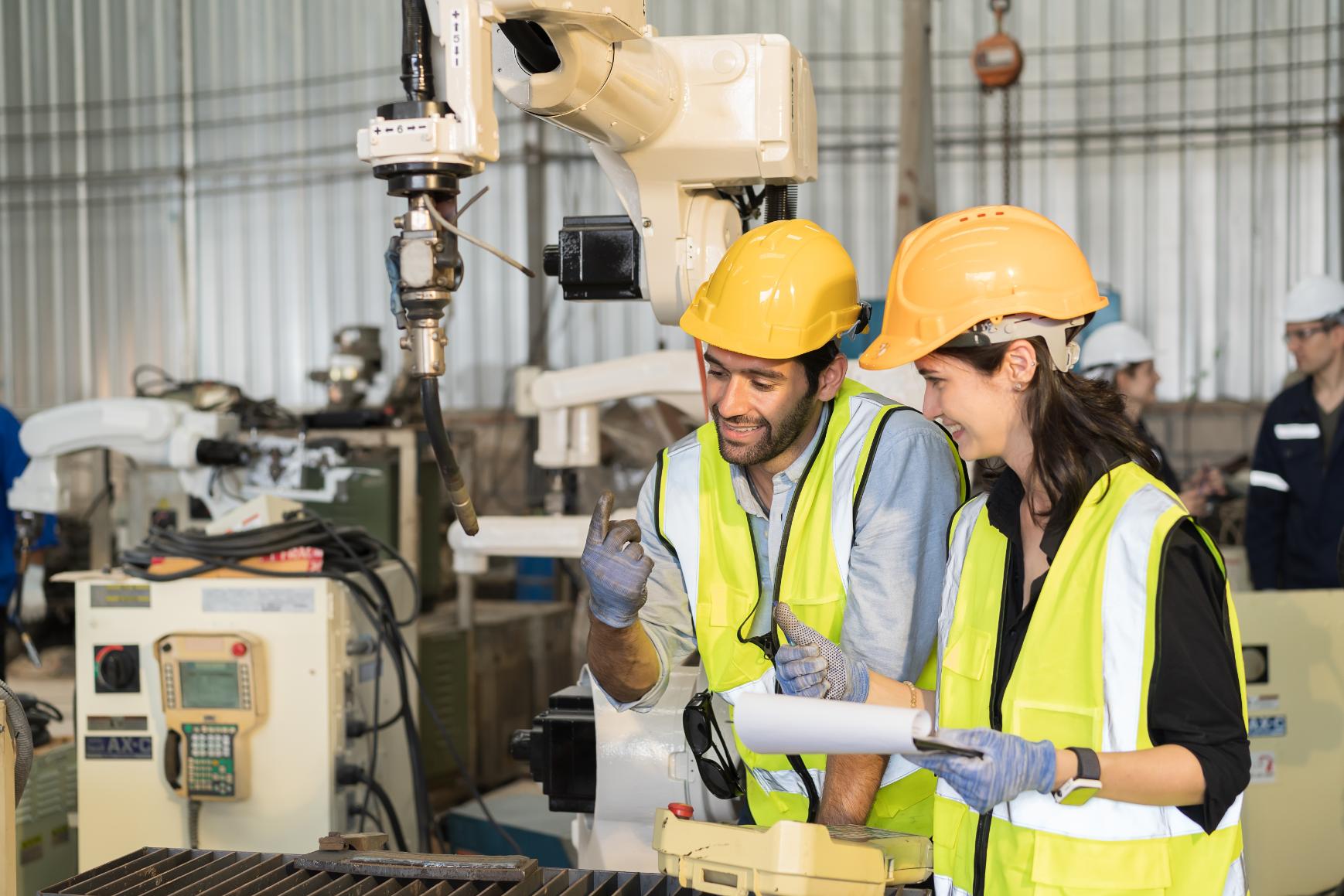AI is transforming modern manufacturing with tangible business benefits. Factories are using AI to optimize processes, predict equipment failures, and automate quality control—and the results are measurable. However, successful AI implementation hinges on one critical factor: data. Without a proper data collection and management strategy, even the most advanced AI solutions, including generative AI, will not deliver the expected results.
This article examines how to effectively gather and utilize data in a manufacturing environment and presents eight areas where AI is already generating significant cost savings and improvements. Whether you are planning your first AI implementation or looking to optimize existing processes, you will find practical guidance on leveraging artificial intelligence in production.
The importance of data in AI and GenAI
Data is the foundation of machine learning and all activities related to artificial intelligence. It’s necessary both for training AI systems and for implementing AI. While synthetic data can be used to some extent to train AI models, in order to implement AI and take full advantage of AI’s capabilities, you need a sufficient amount of real-time and historical data. The manufacturing industry is no exception, and thus the effectiveness of both AI and GenAI in manufacturing operations is directly proportional to the quality of the data used for the training of an AI system.
However, data acquisition can be challenging. For greenfield deployments—where a smart factory is built from scratch—installing devices, planning connectivity, and establishing a comprehensive IIoT network are relatively straightforward. But in brownfield deployments, which are far more common, things become more complex.
A brownfield deployment site is typically a complex environment with a variety of systems, installations, buildings, and machines from different vendors, added over time. This diversity complicates integration efforts. Often, there is no interconnected infrastructure or comprehensive wired network, which hinders efficient data transmission.
Additionally, without suitable software tools for data collection, visualization, and analysis, the full potential of the collected data remains untapped. A mix of IIoT sensor outputs—both analog and digital—further complicates data aggregation and processing.
This is where WISE-EdgeLink comes into play—a gateway designed for device connectivity and communication. WISE-EdgeLink facilitates the collection of IIoT data from various sensors, supporting a wide range of protocols and signal types (both analog and digital) to ensure compatibility with devices from multiple vendors. It also provides dedicated connectors for APIs, frontend web services, and databases, ensuring secure and efficient data integration. With support for MES, SCADA, cloud services, IIoT hubs, and custom software, it enhances connectivity across systems. Additionally, it integrates with AI-powered virtual assistants for data analysis and visualization, offering engineers and maintenance technicians a real-time overview of all production lines and machines.
An effective use case for WISE-EdgeLink is when a vibration sensor indicates that a device has begun to malfunction, signaling the need for predictive maintenance. Since data from all sensors is integrated, this alert can automatically trigger an order for spare parts in the SAP system. This approach enables timely repairs, prevents potential downtime, and optimizes costs by focusing only on necessary repairs.
Read more on AI:
Generative AI in pharma: A virtual assistant for smart sales
LLM agents: the next big thing for GenAI
Leveraging LLM function calling to harness real-time knowledge
Will large context windows kill RAG pipelines?
What is synthetic data and how it can help us break the data wall?
Boosting productivity with an AI personal assistant—three real-life use cases
Finding the best LLM—a guide for 2024
Small language models (SLMs)—a gentle introduction
Generative AI implementation in business: how to do it responsibly and ethically
Ten business use cases for generative AI virtual assistants
Generative AI in knowledge management—a practical solution for enterprisesCurbing ChatGPT hallucinations with retrieval augmented generation (RAG)
Large language models (LLMs)—a simple introduction
RAG vs. fine-tuning vs. prompt engineering—different strategies to curb LLM hallucinations
Baner AI
AI in manufacturing—examples
How can AI help optimize manufacturing processes? We have all come to expect AI-powered robots to replace human workers in performing dangerous or repetitive tasks, but there is in fact much more that artificial intelligence can do for the manufacturing sector. From manufacturing process optimization to industrial data analysis, here are eight real-life examples of how artificial intelligence can transform the manufacturing landscape.
1. Smart manufacturing—production process optimization
Manufacturing artificial intelligence and machine learning can optimize manufacturing processes by identifying inefficiencies and suggesting improvements. These technologies analyze manufacturing data from various stages of production to detect bottlenecks, predict maintenance needs, and optimize resource allocation.
For example, Honeywell leverages AI in manufacturing to optimize production scheduling, with the goal of reducing lead times and improving customer satisfaction. By analyzing data from shop floor sensors and production lines, AI applications can pinpoint areas where processes can be streamlined, or resources can be better utilized. This leads to reduced waste, cost savings, higher productivity, and an overall smarter manufacturing industry.
2. Demand forecasting for the manufacturing market
Artificial intelligence and machine learning can revolutionize demand forecasting by analyzing vast amounts of data quickly and accurately. These technologies can process historical sales data, market trends, and consumer behavior patterns to predict future demand with high precision. For instance, retail companies like Simons use AI solutions to forecast sales and manage inventory.
AI technologies that facilitate demand forecasting reduce the risk of stockouts and overstock situations, ensuring optimal inventory levels. AI tools can help both retail and manufacturing companies to stay ahead by adapting to market changes and customer preferences in real time. This capability allows for more accurate planning, better resource allocation, and ultimately, increased customer satisfaction. Furthermore, AI algorithms can identify emerging trends and seasonal variations, enabling both retailers and companies in the manufacturing sector to capitalize on new opportunities and remain competitive in the ever-changing market environment.
3. Product quality monitoring in manufacturing operations
AI applications for quality control aim to ensure that products meet high standards consistently. Machine learning algorithms can analyze data from sensors and cameras on production lines to detect defects and deviations in real time.
In one real-world example of integrating AI in manufacturing quality control, the automotive industry giant BMW employs a system that captures real-time data and uses a deep learning AI model for image recognition to check “whether all required parts have been mounted and whether they are mounted in the right place.” This saves time, ensures high-quality production, and reduces waste. AI systems can inspect products with greater speed, precision, and consistency than human workers, catching even minor defects that might otherwise be missed.
Automated systems can continuously monitor each step of the manufacturing process, ensuring that every product meets strict quality control standards before reaching consumers. Thus, AI integration in quality assurance not only safeguards consumer health but also enhances brand reputation by consistently delivering high-quality products.
4. Maintenance management in the manufacturing industry
Predictive maintenance based on artificial intelligence has the potential to transform production operations by changing how businesses manage machinery and equipment. Machine learning models can analyze data from sensors to predict when equipment is likely to fail and optimize maintenance schedules, allowing for timely servicing and repairs, which are key components of safety and efficiency in a manufacturing environment. This proactive approach prevents unexpected breakdowns, reduces maintenance costs, and extends the lifespan of assets, thus improving overall operational efficiency.
Companies like General Electric (GE) use AI for predictive maintenance, optimizing equipment performance and maintenance costs and minimizing downtime. By continuously monitoring equipment health and analyzing historical maintenance data, AI can identify patterns and predict potential failures. This allows companies to schedule maintenance activities more effectively, reducing the risk of costly unscheduled downtime. Additionally, predictive maintenance enhances safety by addressing potential issues before they become critical, ensuring that machinery operates smoothly and efficiently.
5. AI in manufacturing—production personalization
AI and machine learning enable mass customization by analyzing customer preferences and automating production processes. These technologies allow businesses to offer personalized products at scale, catering to individual tastes and needs. For instance, Nike decided to adopt AI in their Nike By You platform, which uses artificial intelligence to process customer design choices and adjust manufacturing processes accordingly. This seamless integration of AI ensures efficient production while meeting diverse customer demands.
AI technology enables real-time customization by dynamically adjusting production settings based on individual orders. This not only enhances customer satisfaction by providing unique, tailored products but also reduces waste and excess inventory. By leveraging AI, companies can respond quickly to changing consumer preferences and market trends, maintaining a competitive edge in the market.
6. AI in manufacturing and retail—supply chain optimization
AI and machine learning can enhance supply chain management and improve overall supply chain resilience by providing real-time insights and optimizing logistics. This AI innovation can identify patterns to better predict demand, manage inventory, and streamline transportation, ensuring timely delivery of products.
For example, Amazon has been using generative AI for a number of purposes, but it also employs AI in supply chain management and inventory management to analyze customer orders, optimize warehouse operations, and coordinate deliveries efficiently. This leads to improved customer satisfaction, reduced operational costs, and a more resilient supply chain.
AI models can identify potential disruptions and recommend alternative routes or suppliers, ensuring that the supply chain remains flexible and responsive. By leveraging AI in manufacturing supply chain optimization, businesses can achieve greater visibility and control over their supply chain operations, reducing delays and ensuring that parts reach the shop floor and final products reach customers on time. This supply chain optimization not only improves operational efficiency but also enhances the overall customer experience.
7. Generative AI for technical documentation management
Managing technical documentation in manufacturing environments poses significant challenges. Factory workers, maintenance technicians, and engineers need quick access to vast amounts of information scattered across multiple systems—from equipment manuals and maintenance procedures to technical specifications and troubleshooting guides.
Traditional document management systems often fall short, making it difficult to locate specific information quickly, especially during time-critical situations. Retrieval augmented generation (RAG) offers a solution by combining the power of large language models with precise retrieval of information from verified documents. Unlike standard generative AI that might hallucinate or provide outdated information, RAG ensures accuracy by grounding responses in an organization’s actual documentation. This approach allows for natural language queries while maintaining the reliability of responses, making technical knowledge more accessible and actionable.
Here’s how one of our clients, a global manufacturer of heavy machinery, successfully implemented this technology to transform its documentation management. The company faced challenges with scattered documents, including operator manuals, technical specifications, and maintenance guides, which were spread across different systems and available in multiple versions. This made it difficult for employees to find accurate, up-to-date information, impacting productivity and prolonging the onboarding process for new hires.
An AI solution for knowledge management powered by a retrieval augmented generation (RAG) mechanism was adopted to address these issues. It allows users to upload large sets of documents and ask natural language questions about their content through a chatbot interface. The RAG system ensures that employees receive correct answers based on verified sources, improving access to organizational knowledge and enhancing overall productivity. Additionally, the solution supports multiple languages, enabling users to ask questions in their native language and receive accurate answers regardless of the original document’s language. The company plans to expand this solution to include all company documentation and add a voice recognition feature for verbal queries.
8. Generative AI in industrial data analysis
Manufacturing facilities generate massive amounts of data from sensors, equipment, and production processes. Turning this data into actionable insights can be a significant challenge. Traditional data analysis approaches often require specialized knowledge of programming and statistical tools, making it difficult for plant managers and operators to quickly access and interpret the information they need. Furthermore, the complexity of industrial systems means that identifying the root causes of problems or predicting potential failures requires analyzing multiple data streams simultaneously—a task that can overwhelm human analysts.
Even when companies have data scientists on staff, the time required to prepare, analyze, and visualize data means that critical insights might arrive too late to prevent problems or optimize processes. These challenges underscore the need for more accessible and efficient ways to analyze industrial data in real time, particularly solutions that can bridge the gap between complex data analysis and practical, shop floor decision-making.
To meet these challenges, we built an AI virtual assistant that leverages generative AI to enhance industrial data analysis, providing actionable insights in real time. By integrating OpenAI’s LLMs with IIoT data and a RAG pipeline, the assistant can interact with data through an intuitive chatbot interface. When a user, such as a plant manager, asks a question, the LLM generates a Python script that retrieves, visualizes, and analyzes the data as requested. This system is designed to recognize data-related queries and select the appropriate data for responses, drawing conclusions and generating various types of charts.
Additionally, the AI assistant offers insights into potential root causes of detected anomalies, recommending actions for maintenance technicians. This capability is powered by the integration of a RAG pipeline, which provides the assistant with the necessary knowledge to accurately respond to user queries.
Finally, our assistant includes a predictive maintenance module that forecasts sensor readings based on historical data. This allows us to anticipate potential machine failures and take necessary maintenance actions in advance.
AI in manufacturing—conclusions
The eight AI applications we’ve examined demonstrate clear paths to improving manufacturing operations:
- Quality control systems powered by computer vision can reduce defect rates.
- Predictive maintenance solutions help prevent costly breakdowns, extending equipment life.
- AI technologies using RAG for technical documentation management can significantly reduce the time workers spend searching for information, from hours to minutes.
For manufacturers starting their AI journey, the key is to begin with well-defined, data-rich processes where improvement metrics can be clearly measured. Whether implementing a predictive maintenance system for critical equipment, deploying AI-powered quality control on high-value production lines, or using generative AI to streamline technical documentation access, success depends on building the proper data collection infrastructure. Companies should start by auditing their current data collection capabilities, identifying gaps, and implementing solutions like WISE-EdgeLink to establish reliable data flows.
Should you need support with your next IIoT project, we are eager to help. Together with our partner Advantech, we can build your IIoT network from the ground up, covering both hardware and software layers. Drop us a line at sales@fabrity.pl to discuss the details.









